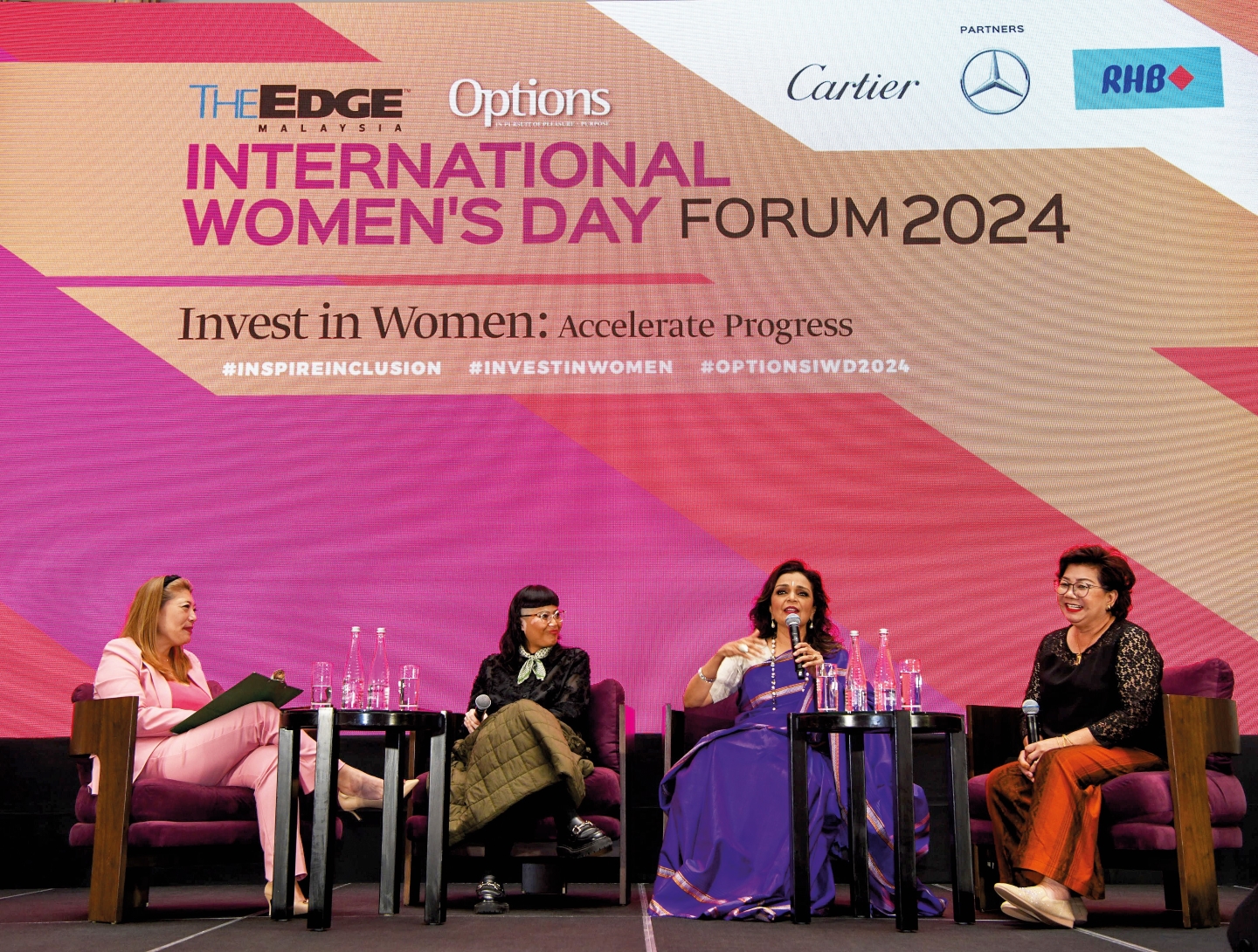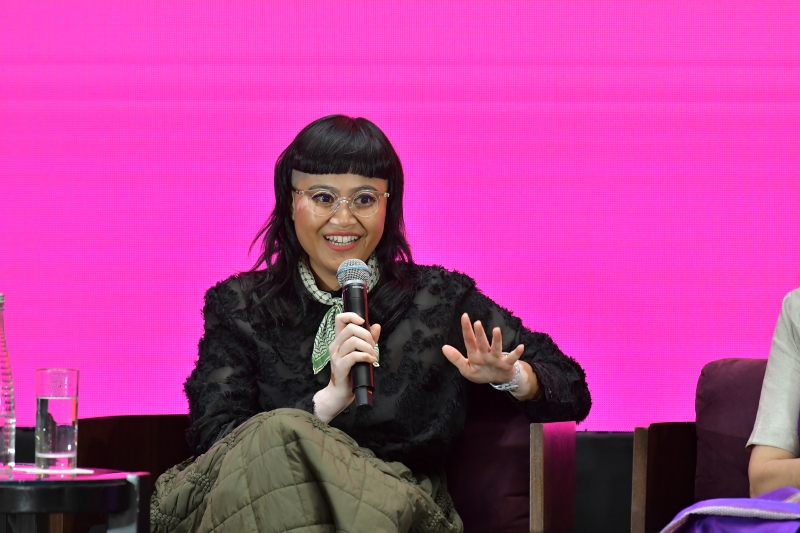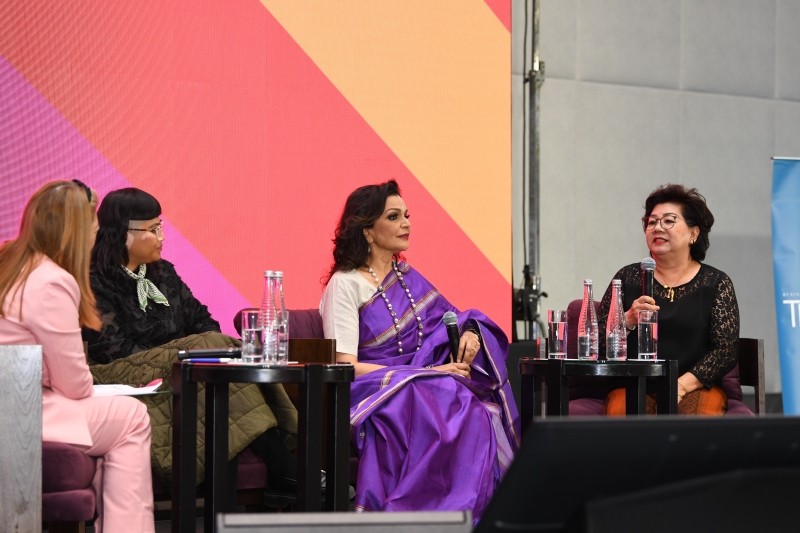
From left: Moderator Freda Liu, Nadirah, Anita and Beh (All photos: Low Yen Yeing/ The Edge Malaysia)
Internationally celebrated photographer Nadirah Zakariya shares the stage with Malaysia’s first Michelin-starred female chef Beh Gaik Lean and Chennai-based dance icon and cultural activist Dr Anita Ratnam to talk about the road ahead for creative women and how we can support our young girls looking to embark on a career in these industries.
Options: Gaik Lean, cooking is undoubtedly a key contributor to your success, but it seems like an equally big push factor was the simple act of a mother’s love, of cooking to feed your family. We understand you were once with Motorola as well. Tell us about it.
Beh Gaik Lean: I started as a chef with Motorola at 21 years old. At that time, when Motorola first came to Penang, it had a lot of employee values in mind. I did industrial cooking. We had 44 hours of training per year, regardless of what position you were holding. That was how my luck came in. It was a very good learning platform for me. I was trained in management and other fields such as budgeting and all that for the cafeteria to run.
My son asked, ‘Mummy, if I opened a restaurant, would you come back?’ I said, ‘Yes, of course, because you’re my son.’ He told me otherwise if I died, I would take all my secrets with me!
Nadirah, on the subject of your powerful Andartu images, why do you think that men fear the idea of a self-sufficient independent woman so much that they resort to name-calling?
Nadirah Zakariya: For some context, I’m a photographer and work a lot with self-portraiture. One of my recent series that I did was called Andartu, which is a term used for anak dara tua, or spinster. And I explored this topic because of a question that I have been asked since I left high school: Bila nak kahwin? (When are you getting married?)
I’ve been published and exhibited my work here and there, but I’m still asked, ‘Tapi bila nak kahwin?’ So, I decided to explore this subject through my photography. I did a series where I inai [put henna on] my hand with the ‘bila nak kahwin?’ phrase. I had fun with it. But to answer your question, to be honest, I think that’s a question for men. Maybe it’s misogyny or fragile masculinity. Or you know, they’re used to traditional gender roles that have been cast upon us.
20240311_peo_the_edge_international_womens_day_forum_2024_lyy_1244.jpg

Dr Anita, India is leading the way in showing the world how arts can thrive. A February 2024 report by Forbes says this booming cultural growth is largely due to the artists and practitioners taking the situation into their own hands and growing it from the grassroots level. Why do you think this has happened?
Dr Anita Ratnam: My country right now is on the move. It is turbocharged. Anybody who reads about it, visits it, can feel a sense of momentum. But my question is, are women also part of this development? Are we included in this? And when we say women today, we must include everybody who identifies as female, because there’s a huge push in the Indian creative world to have transgenders and those who are non-binary who want to embrace the arts and want to be seen and acknowledged as such. So, there are a lot of barriers being pushed.
Right now, the entertainment or culture push seems to lean towards Bollywood, but there was a time when classical artists would accompany presidents and prime ministers on international cultural delegations. So, that has shifted. There is a greater emphasis on popular culture and spectacle, which in solo form cannot deliver.
Do you feel art fairs, biennials and dance festivals are crucial to making the arts more accessible to the public?
Nadirah: A hundred per cent. I also run a photo festival called Exposure+ Photo around Kuala Lumpur. We’ve done it for three years now. It’s important to make art more accessible and share more stories. Photography is a powerful tool to learn about the world and each other. Through these festivals and fairs, we can … get to know each other more. When we have more understanding, we have more empathy. So, I’m all for it.
Gaik Lean, why do you think fine dining and Michelin stars are still so heavily dominated by men even though the kitchen is the traditional realm of women?
When I was younger, I always wanted to go to a good hotel and work, but I got so many rejections. They didn’t want females in the main kitchen. When I was in my early thirties, I went to a six-star hotel for an interview. They told me: No women in the main kitchen. I came back and felt so depressed and disappointed because, when I saw all those imported ingredients from outside Malaysia, I felt like I just wanted to go in, put my apron on and work. But then, it was not the case during my time. Now that I have a Michelin star, I am so very happy and — what do you call it? — recharged!
20240311_peo_the_edge_international_womens_day_forum_2024_dsc_8775_lyy.jpg

Dr Anita, you are familiar with Malaysia, having visited often and with good friends here. From your point of view, what more can we do to elevate arts and culture in the country?
We’re actually arguing now, with all this emphasis on Indian education, about marks and percentages in the STEM subjects. Why are we not [making] a liberal arts curriculum mandatory? So, push liberal arts, not just dance, in schools. Historically, test after test shows that if you’re into music, your aptitude and scores are just as high. Our classrooms are filled with music and dance students, but how many will go on to a professional level and take it beyond just a gig or performance? We should explore how we can take up training and then use it to work with both the right- and left-brain thinkers.
Gaik Lean, were you surprised that Nyonya food got the Michelin recognition?
I really was very surprised. I am so very proud that I managed to get this kind of food on the world stage. I have a lot of foreign diners who tell me the cooking is good. There’s a lot of hard work and love put into it. At 69, what could be better?
What do you think the future holds for women in the creative industry? What are the other barriers that need to be broken?
Nadirah: One of the barriers I see in the artists around me is confidence. We need to build more confidence and tackle the imposter syndrome. We need to boost each other up.
Beh: Younger people should try and understand that this kind of cooking is a dying art. The parents must buck up and train their girls a little better. It’s old school, it’s hard work and, nowadays, young girls are not willing to put in so many hours in a hot kitchen.
Anita: India has more and more women CEOs, but they are not supporting the arts. I really want to spend more time on the advocacy of women CEOs, to help them understand that it is important to invest in women in the arts on a long-term basis. I now have an all-women ensemble in my company. To have them playing the mridangam and percussion? Very rare in India.
This article first appeared on Mar 25, 2024 in The Edge Malaysia.


